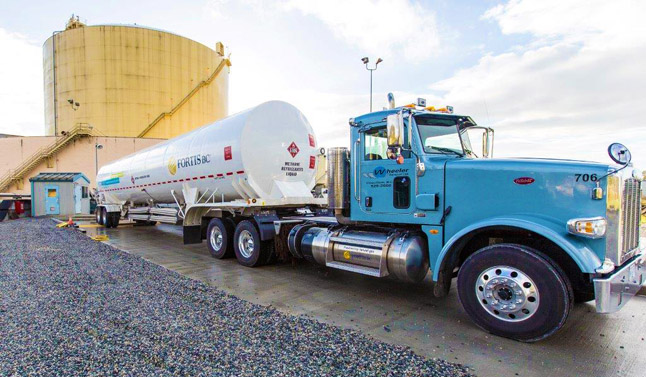
By Laura Stovel
Many people in Revelstoke welcome the prospect of having liquefied natural gas (LNG) as a ‘cleaner,’ cheaper alternative to propane. Mayor Mark McKee reflected this view when he said, “Liquefied natural gas provides clean and efficient energy which is going to decrease costs for local businesses and residents. Fortis will provide natural gas for our community at the same rate as for everyone across the province” and that’s a good thing, he said.
Bringing natural gas to Revelstoke is part of a province-wide push by FortisBC to “amalgamate its customers to natural gas service,” said FortisBC Community and Aboriginal Relations Manager Blair Weston.
This comes at a time when the provincial government is banking on large-scale expansion of natural gas extraction and processing in northern BC. With plans to establish five LNG facilities in the north and significantly expand production, the BC government is selling LNG as “the world’s cleanest burning fossil fuel – an environmentally friendly commodity.” Even a government agency’s LNG logo has the word ‘clean’ in it.
But is LNG really a ‘green’ solution and is it overwhelmingly positive for Revelstoke? Some local experts say the answer is not clear-cut. This three-part series explores the benefits and the costs of bringing LNG to Revelstoke.
Part I: The plan
FortisBC is preparing to apply to the BC Utilities Commission this June to bring natural gas to Revelstoke and the company hopes to have approval by the end of 2015 and have the new fuel up and running in 2017. If the application is successful, Revelstoke consumers will benefit from “lower, more stable rates,” and will see an immediate 16% drop in its CO2 emissions” attributed to heating with gas, according to FortisBC spokesperson David Wylie.
According to FortisBC project manager Joe English, the price of natural gas is cheaper and much more stable than that of propane. The price of propane “is so volatile that you can’t budget easily. A year ago the price of propane was four to five times as much as natural gas.” Natural gas does not have extreme fluctuations, he said.
Revelstoke customers will not have to pay anything to convert their existing essential appliances such as water heaters, stoves and furnaces – Fortis will cover those costs. Some specialty items that are especially expensive to convert may not be covered. “From the customer perspective, conversion would just involve making the appliance available to someone at Fortis” who would do the work, Wylie said.
Although FortisBC gets almost all its LNG from northern BC (a little comes from Alberta), Weston and Blair distanced the Revelstoke initiative from the significant natural gas extraction and processing expansion in northern BC, saying the two are only slightly connected.
FortisBC owns the Tilbury Island LNG storage facility in Delta, BC, which holds emergency natural gas for “peak shaving” – for use when there is extra high demand for natural gas in the Lower Mainland. Most of the time that natural gas just sits in storage. The company seeks to sell it to new markets like Revelstoke and Inuvik to better use the storage facilities, they said.
Technological improvements in transportation expand markets both directly and indirectly. Some diesel transport trucks and ferries are being converted to run on natural gas, and improvements in tanker trucks enable FortisBC to truck LNG longer distances, including to Revelstoke, which was previously considered to be too remote to be serviced with natural gas.
The claim that this initiative simply better uses existing capacity does not present the full picture, however, as FortisBC is in the process of expanding its Tilbury storage facility, adding an additional storage tank. Weston also acknowledged that these changes are helped by a “supportive policy environment” in BC, though he said that some of these policies preceded the large-scale expansion of natural gas in northern BC.
Weston estimated that Revelstoke would consume around 125 truck tanker loads a year. “During the peak heating season, we anticipate one to two tanker deliveries per day. During summer months, one tanker delivery per week would be more common.” Currently, propane is shipped to Revelstoke in liquefied form by train from Alberta.
The LNG will be stored in a cryogenic vessel, requiring “no active refrigeration,” Weston said. “This vessel performs like a thermos for your hot coffee, except in this case it’s keeping the cold liquid cold. LNG can stay cold (-162° Celsius) for up to 100 days.”
The fuel that consumers use will be natural gas, not liquid gas. “The LNG will be revaporized at the storage facility before being injected into the town’s existing distribution system,” Weston said.
With the emphasis on natural gas emitting less CO2 than propane at the point in which consumers use it, LNG is being touted as a step forward for the environment, but is it? Until recently there has been little public discussion about whether this shift is a good thing for Revelstoke — and for the planet. However some energy experts in Revelstoke are deeply concerned for both economic and environmental reasons. In the next part of this series we will look at some environmental concerns.



